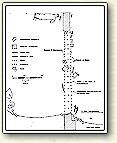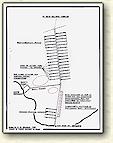|
|
|
Footnotes and
Sources |
|
(1) There are literally hundreds of separate treasure stories
emanating from World War Two. For a general overall understanding of just how monetary
securities affected both the geopolitical and operational aspects of World War Two a good
reference, although not directly related to Corregidor Island itself, are the series of
reports recently published by the US Dept. of State regarding Germany’s clandestine
attempts at hiding appropriated war booty. One such report, "Preliminary Study
on U.S. and Allied Efforts To Recover and Restore Gold and Other Assets Stolen or Hidden
by Germany During World War II", June, 1998. (The Author has often wondered
why a similar study was not conducted on the Pacific War aspects of war booty).
(2) The rather complete
files regarding the Philippine Central Bank records, the National City Bank records, and
the Army Finance records relating to the evacuation of the Philippine National Treasury to
Corregidor Island can be found within the National Archives and Records Administration,
(NARA), under Record Group, (RG), 104, Legal Records, Reports on Deposits of Foreign
Bullion, (104.3.2).
(3) A good account of Mrs.
Willoughby’s experience in the inventorying and disposition of the Philippine
National Securities can be found in her published transcripts, entitled:
"Gold Is Also Ballast", 1969.
(4)
The involvement
of the "Don Esteban" and the Presidential yacht "Cassiano", as well as
the presence of Admiral Hart at the Manila docks is well documented within NARA, Record
Group 313 (5.3); Records of the Pacific Fleet and Records of Commander – Submarine
Force, Pacific Fleet, 1931-1959.
(5) Willoughby,
"Gold Is Also Ballast"
(6) The accounts
reflecting the exact inventory data of the Philippine National Treasury can be fond within
NARA, Record Group 268, Records of the Philippine War Damage Commission. According to this
data, the Treasury consisted of: 115 tons of silver specie, 32 tons of silver bullion,
51.385 tons of Government gold bullion, 2 tons of private gold holdings, 27 million in US
Treasury Notes, and an unspecified amount of Bonds, Treasury Certificates, and precious
gem stones. The gold bullion alone was valued at 40 million dollars US at $ 32.00 per oz.
(7)
The accounts of
the burning of the US paper currency is reflected within many contemporary and official
histories. However, this was also verified by ‘Mo’ Solomon in his interviews
with the author in 1987.
Maps: |
|
 |
 |
 |
|
Recoveries from
South Dock Area 1988 |
Recoveries from
South Beach Area
1988 |
Navy Tunnel
Storage Areas
1988 |
|
Interviewed
Personnel:
Gunn, Frederick A.
– Rear Admiral, USN (ret.). Admiral "Pop" Gunn was a Lt. and
Engineering Officer on board the USS Trout at the time of the latter’s visit to
Corregidor Island on 3 and 4 February, 1942. His detailed accounts of the removal of part
of the Philippine National Treasury was recounted in several audio-tape interviews with
the author.
Solomon, Morris –
HTC/Diver,
USN, (ret.). ‘Mo’ Solomon was stationed aboard the US navy Tug Pigeon when War
War Two broke out in the Philippine Islands. Being a diver and a Prisoner of War held by
the Japanese after the fall of Corregidor, ‘Mo’ was forced to dive for the
silver pesos in San Jose Bay and was eventually transferred to various Japanese prison
camps on the Philippine mainland. The vivid accounts of his various experiences were
recorded on audio-tape by the author.
Inhabitants of Corregidor Island, R.P.
– Many individuals living on the island were interviewed by the Author for this
collection of stories. If not for their accounts this small collection of data would have
no continuity or foundation.
|
Published
Sources:
"United States Naval Operations in World War Two: vol. III,
‘The Rising Sun In the Pacific’; by Samuel Elliot Morrison, 1948
"Corregidor, The Saga of a Fortress", by James H.
Belote
"South From Corregidor", by General Jonathan
Wainright, (USA, ret.)
"Battle Submerged", by Rear-Admiral Harley Cope,
(USN ret.), 1951
"Pig Boats", by Theodore Roscoe, 1949
|
Archives /
Documents:
National Archives and Records Administration,
College Park, Maryland
Record Group 104: Records of the U.S. Mint – Legal Records &
Reports
Record Group 181: Records of Naval Districts & Shore Establishments
Record Group 217: Records of the Accounting Officers of the Dept. of the Treasury
Record Group 260: Records of the U.S. Occupation Headquarters, World War II, General
Headquarters, U.S. Army Forces in the Pacific
Record Group 268: Records of the Philippine War Damage Commission
Record Group 313: Records of the Pacific Fleet, 1931-1959
Record Group 332: Records of United States Theaters of War, World War II
Record Group 338: Records of United States Army Commands - 1942
Record Group 392: Records of United States Army Coast Artillery Districts And Defenses,
1901-1902
Record Group 395: Records of the United States Army Overseas Operations and Commands,
1898-1942
U.S. Army War College – United States Military History
Institute, Carlisle Barracks, Carlisle, PA
Various files, folios, Engineering files, and Unit histories consulted.
|
|
POST-WAR RECOVERY OPS 1945-88
|
SPEEDY GONZALES
|
BATTERY MORRISON
|
AH-MOON'S
|
THE ENGINEERING TUNNEL
|
GRAVE - GOLD
|
THE MARCOS CONNECTION
|
THE NORTH
DOCK GOLD HOLE
|
THE FOURTH LATERAL
|
THE NORTH
HARBOR SALVAGE BARGE
|
THE PRESIDENTIAL YACHT "CASIANO"
|
THE LORCHA DOCK
|
SILVER PESOS
|
NO MORE GOLD
|
CONCLUSION
CORREGIDOR - THE TREASURE ISLAND OF WWII
|
GOLD IS ALSO
BALLAST |
THE GOLDEN
PATROL OF THE USS TROUT |
SALVAGING A SILVER TREASURE |
THE JAPANESE OVERSTRIKE
|
|
|
 |
|

